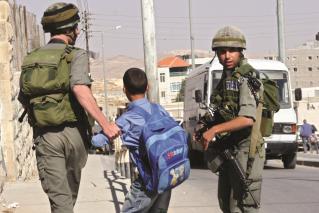
Dear friends,
For several years I have been following the complicated and distressing stories of minors from East Jerusalem suspected of throwing stones. Hundreds of minors are arrested each year, and in too many cases their rights are violated during criminal proceedings.
An amendment to Israel’s Youth Law, which was passed in 2008, addresses the detention of minors and emphasises that proceedings against minors must be carried out while maintaining the child’s dignity in a way that promotes their rehabilitation and re-integration into society. The law was passed in recognition of the fact that children and teenagers are more vulnerable than adults. Arrest, interrogation and imprisonment, where are unpleasant experiences for adults, are often traumatic experiences for young people. Such trauma can affect the future and direction of these young people’s lives.
The law recognizes that the right treatment can promote good chances of rehabilitation. For this reason, the law prescribes that minors should not be held on remand, and that alternatives to detention should be used – such as electronic monitoring or house arrest. Instead of imprisonment, the law provides for minors to be sent to probation services or day centres.
In recent years these principles of the Youth Law have been ignored with respect to minors suspected of, or prosecuted for, stone throwing, or security or public order offenses in East Jerusalem. Today, the main and perhaps only consideration taken into account by the authorities is what they define as “deterrence”.
A series of government decisions, legislative amendments and changes to the Office of Prosecution’s guidelines in recent years have led to the development of strict and limiting policies – which have resulted in long periods of detention and the abandonment of rehabilitation.
Last week we published a report by Attorney Nisreen Alyan and Meytal Russo, which analyses the various policy changes in recent years and the impact this has had on minors. The report includes research conducted in Israel and all over the world, which indicates that prolonged imprisonment at a young age does not increase deterrence, but on the contrary, may increase the rates of reoffending among youth. Research conducted among residents of East Jerusalem indicates negative trends such as dropping out of the education system and behavioural issues amongst children and adolescents who have experienced interrogation or detention.
None of us doubt that human life is precious and must be protected. Throwing stones endangers human life, and the outcome can be tragic. But is it right to raise a generation of children from East Jerusalem behind bars, without making an effort to change the course of their lives for the better?
Today, children in East Jerusalem are growing up in the heart of a political conflict, under occupation; and they experience harsh conditions of poverty and neglect. ACRI has been working for years to change the harsh reality in which children are living in East Jerusalem, and to improve access to education and social services.
With respect to youth detention, we are advocating for the police and prosecution to adopt alternatives to detention that are appropriate, and to prioritise treatment and rehabilitation. If we accept these severe punishments, we are effectively giving up on the next generation and our opportunity to build a less violent reality for them and for us. Is this the kind of future that we want? In my opinion, we simply cannot give up on the best interests of a child.
Yours,
Sharon
Sharon Abraham-Weiss
Executive Director
Association for Civil Rights in Israel








